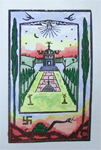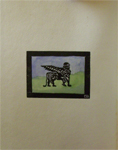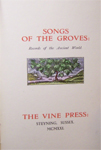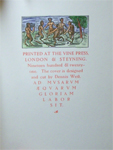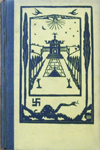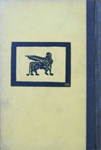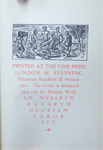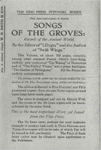100th
MP

|
THE
100th
MONKEY
PRESS |
|
|
|
Limited Editions by Aleister Crowley & Victor B. Neuburg |
|
Bibliographies |
|
Download Texts
»
Aleister
Crowley
WANTED !!NEW!!
|
|
SONGS OF THE GROVES |
|
»» Download Text «« |
Image Thumbnails |
|||||||||||||||||||||||||||||||||||||||||||||||||||||||
|
Title: |
Songs of the Groves: Records of the Ancient World |
Cover State (a) Rear State (a) Spine State (a) Frontispiece State (a) Rear Graphic State (a) Title Page State (a) Limitation Page State (a) Vine Press State (a) Cover State (b) Rear State (b) Spine State (b) Frontispiece State (b) Rear Graphic State (b) Title Page State (b) Limitation Page State (b) Vine Press State (b) Dust Cover State (b) Dust Cover Rear State (b) Dust Cover Spine State (b) Dust Cover Interior State (b)
Prospectus
Prospectus
|
||||||||||||||||||||||||||||||||||||||||||||||||||||||
|
Variations: |
|
|||||||||||||||||||||||||||||||||||||||||||||||||||||||
|
Publisher: |
The Vine Press. |
|||||||||||||||||||||||||||||||||||||||||||||||||||||||
|
Printer: |
Vine Press. |
|||||||||||||||||||||||||||||||||||||||||||||||||||||||
|
Published At: |
London and Steyning. |
|||||||||||||||||||||||||||||||||||||||||||||||||||||||
|
Date: |
circa August 1921. |
|||||||||||||||||||||||||||||||||||||||||||||||||||||||
|
Edition: |
First Edition. |
|||||||||||||||||||||||||||||||||||||||||||||||||||||||
|
Pages: |
[4] + xx + 139 + [5]. |
|||||||||||||||||||||||||||||||||||||||||||||||||||||||
|
Price: |
State (a) priced at 63 shillings. State (b) priced at seven shillings sixpence. |
|||||||||||||||||||||||||||||||||||||||||||||||||||||||
|
Remarks: |
Original woodcut illustrations on cover and throughout the book were designed and cut by Dennis West. Includes a pictorial dust jacket. Title-page and printer's device printed in red and black. Printed by hand on Victor Neuburg’s printing press. |
|||||||||||||||||||||||||||||||||||||||||||||||||||||||
|
Pagination: |
|
|||||||||||||||||||||||||||||||||||||||||||||||||||||||
|
Contents: |
- Dedication - Dedicatory Lines - Proem - Cretan Epithalamium - Downwood - Intermezzo - Plato's Love Song - The Lament for Adonis - An Hymn for Diana - Druids - Philomel - The Wooing - Panthea - Gold Night - Night-Song for Bacchus - Lucius by the Sea-Shore - Chant Royal of Horace - A Song of Stars - The Vigil of Venus - The Garden of Pythagoras - Colophon |
|||||||||||||||||||||||||||||||||||||||||||||||||||||||
|
Author’s Working Versions: |
|
|||||||||||||||||||||||||||||||||||||||||||||||||||||||
|
Other Known Editions: |
||||||||||||||||||||||||||||||||||||||||||||||||||||||||
|
Reviews: |
Modern touches of daintiness in the typography of this pleasant and interesting book of verses by an unnamed writer do not militate against the claim suggested by its sub-title. But the ancient world did not write like this enterprising and entertaining after-comer. He translates Bion, indeed; sings hymns to Diana; renders a love-poem of Theocritus; imagines what the Druids may have looked like while sacrificing; acclaims Bacchus and Horace; and makes abysm of time. But he is never more at home than in the closing piece that shows him seeking refuge in his garden from the disorders of the twentieth century, and foretelling a return to natural things. —The Scotsman, 15 August 1921. ______________________________
The (twenty-one) poems in this volume owe much to the classics, for they touch on Bacchus and Venus, Philomel and Diana, on Plato, Pythagorus and Horace (the last is a stately chant royal). The format of the book, of which only 550 copies have been printed, is ingenious. —The Graphic, 27 August 1921. ______________________________
Songs of the Groves emanates from the Vine Press and modesty or something else obscures the author’s identity. It is a well-printed and bulky volume of derivative verse shewing little power of translation and less labour. The rhyme misguides the sense. A prose argument introduces poem after poem and everything in the book from the mere paper to the matter is over-elaborate and pretentious. —The Cambridge Review, 4 November 1921. ______________________________
Songs of the Groves: Records of the Ancient World. (The Vine Press: Steyning, Sussex: 1921), has a singularly charming account of a rustic courtship. The Wooing, the poem to which we refer, is a rendering from the Greek of Theocritus, and is remarkable for the vivid picture conjured up before our eyes in a few lines of verse. Daphnis, a young shepherd, and a maiden, discourse of love and marriage; eventually she yields to his passion:—
“Remove your hand, you satyr; do not seek my blossoms so! Just a first glance! Oh! I must see those snowy flowers of mine! O Pan! O Pan! I’m fainting! Take away that hand of thine! Darling, look up! Don’t tremble so! Why fear your Lycidas? Oh, Daphnis! I shall spoil my robe; it’s filthy on this grass. But—just see here!—the softest fleece over your robe I’ve thrown. Ah me! Oh! Don’t undo my belt! Why do you loose my zone? Because the Paphian Queen must have it for an offering. Some one will come! I hear a noise! Leave off, you cruel thing! A noise? My cypresses: they murmur how my darling weds. Oh, I am bare! You’ve torn my robe into a string of shreds! A better robe I’ll give you soon; a larger robe I’ll buy. Oh yes! You’ll give me all, when soon salt even you’ll deny. Oh, I could pour my soul into you for your dear delight! Forgive, O Artemis, forgive your faithless acolyte. Venus shall have an ox; a calf for Cupid I will burn. A virgin came I hither, but a woman shall return. The nurse, the mother, of my babes, now never more a maid. So with young limbs entwined in love all joyously they played. Soft-murmuring each to each; then from their secret couch they leap: She, when she had arisen, went away to feed her sheep; Shame was in her eyes, but her heart beat high above: Joyous, he went to feed his flocks, glad from the bed of love.”
—The Way of a Virgin, 1922. ______________________________
Occasionally—at intervals far too long, alas!—there reaches the sad groaning tables of reviewers a little volume whose charm and distinction brings with it the freshness and surprise of a May Queen dancing into a committee meeting of frowsy kill-joys or a jolly young Bacchus raiding the headquarters of the Pussy-foots. There have only been five of these occasional volumes, including a sort of distant relative which, being outside the series, I do not mention here. They come modestly into the world, receive a really notable appreciation from some of our few discriminating reviewers, and pass, no less modestly, into, I imagine, the goodly company of books kept by our connoisseurs. For modesty is the one natural raiment of these volumes. The title-pages bear the imprint “The Vine Press, Steyning,” which is just sufficient to tell you whence, in Sussex, you may secure copies. Indeed, beyond that, in none of them except the “distant relation” and the fifth shall you find any clue as to authorship or editorship. On the other hand, you will not need to look over many pages to find verses of perfect and captivating tune—idylls that make the pipes of Pan flute again over the years that are still. Much of the verse is the work of a poet who can express himself in a fine lyric measure, of one who is steeped in folklore, and of one who can distil the golden classics not merely as a translator but as a creative artist; the remaining verse, some of it little known and precious, is by poets with similar qualities, the selection showing a very extensive sympathetic knowledge. The first of these volumes was Lillygay, an anthology of anonymous poems which a writer in an early November Number of The Bookman’s Journal hailed as “a benediction of a book—a book eternal” in whose pages the reader might “re-capture lost May Days and lost pay-days.” Nest, a year later, appeared the anonymous Swift Wings: Songs in Sussex, containing some rich melodies which more than maintained the promise of the original work in the previous volume and augured well for the future. Songs of the Groves, the successor (1921), was in some ways a more ambitious work, in which the author, still veiling himself, in achieving some finer moments in his songs and translations frequently ran the full course of his unrestrained themes of Arcadian loves and passions. The latest volume is Larkspur: A Lyric Garland, by various hands. These books are issued in certified ordinary editions of 550 copies, each numbered, printed on antique laid paper, for a few shillings each; with editions de-luxe limited to 40 copies on handmade paper, the woodcut decorations hand-coloured, numbered and signed. There is a very individual note in the production of these books, and though they offer points for typographical criticism, the founts of type used and the arrangement are in effective harmony with the verse. The woodcuts, variously by Eric and Percy West, are crude (though better in some of the later examples), but there is character in them which makes their very crudeness delightful. Altogether, one feels in handling the volumes that they have been dreamed over, and planned, and dreamed over again: they are instinct with the spirit of the verse of the Dedication in Larkspur—
So to the Rose of Beauty, The Heart in each Star impearled, Is sung the Artist’s duty, The Poet’s love for his world.
As for Larkspur, the recent publication of which is the occasion for the above notes, this book is a departure from the previous ones in the series. An anthology, the poems—with the exception of the Dedication, Prologue, Epilogue and Colophon—are this time ascribed, the “contributors” being given as Tom D’Urfey, John Norris, Robert Greene, Dr. James Smith, John Keats, Chrystopher Crayne, Aphra Behn, Edward Moore, Paul Pentreath, Nicholas Udall, William Drummond, Edmond Waller, Harold Stevens, Laurence Edwards, Arthur French, and Nicholas Pyne. Now, there are some names here that we know well enough; but there are others for which we may search the British Museum until we tread on our beards without ever tracing the authors and their alluring lines. I would fain pursue this matter now, but I leave it until I have more space and liberty. Keats? I wonder how many lovers of Keats know a five-stanza poem credited to him, “Sharing Eve’s Apple,” whose last verse is:—
There’s a sigh for yes, and a sigh for no, And a sigh of I can’t bear it! O what can be done, shall we stay or run? O cut the sweet apple and share it.
Larkspur, with its known and unknown singers, is a book to transport the reader to the woods and their spirits
Rose-leaves rustle And poppy-leaves fall; Oak-boughs tussle And rude rooks brawl
And to far-off things which are the best things and near enough for those who sing with “The Amorous Shepherdess” (by Chrystopher Crayne)
O come my deare! Thy Love is here, And waits the silver straines Of thy sweete Pipe Nowe Sprynge is rype, Come with the firste new Raines.
There is no better recommendation than to say that Larkspur will go with its predecessors to join the goodly company of books sought by those who delight in these “Songs of ripe-lipped love and of honey-coloured laughter: old lamps for new: ancient lights.” —The Bookman's Journal, March 1923.
|
|||||||||||||||||||||||||||||||||||||||||||||||||||||||


